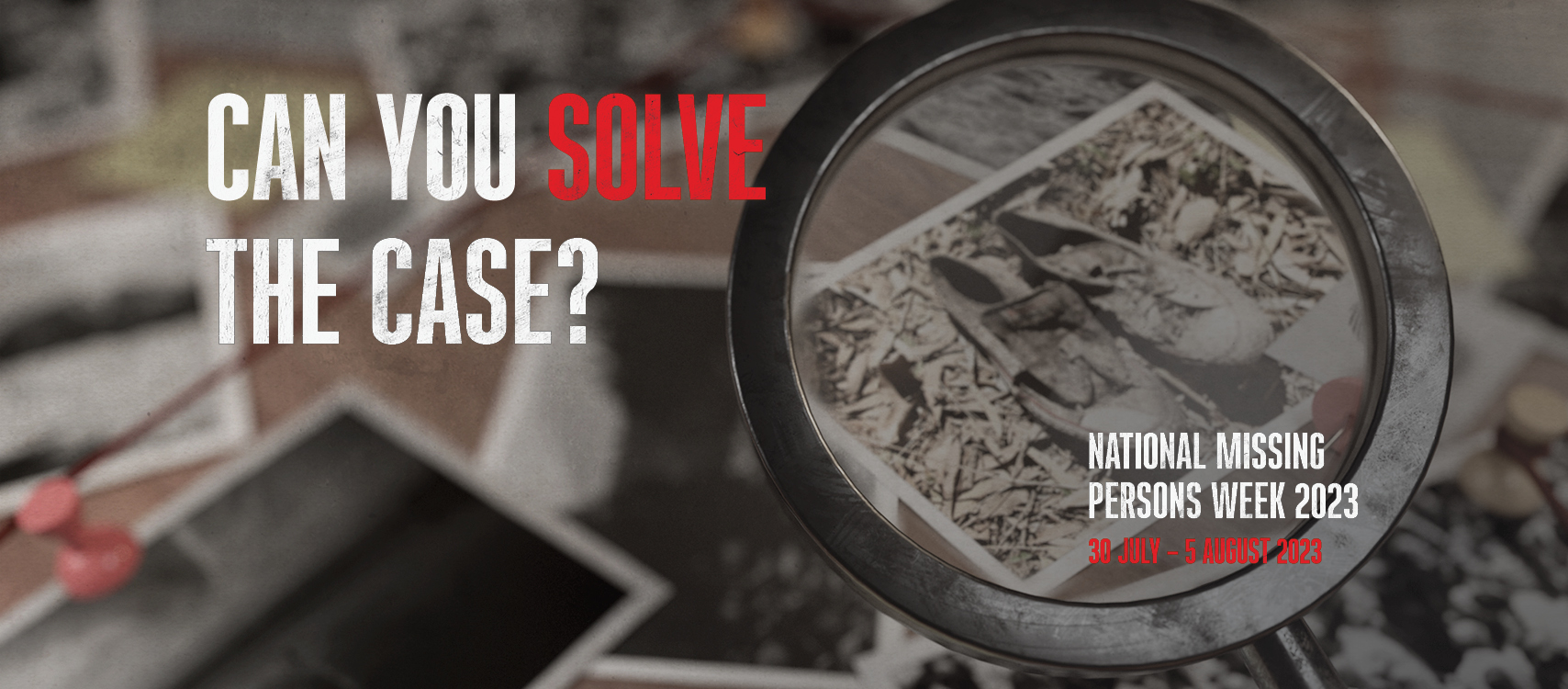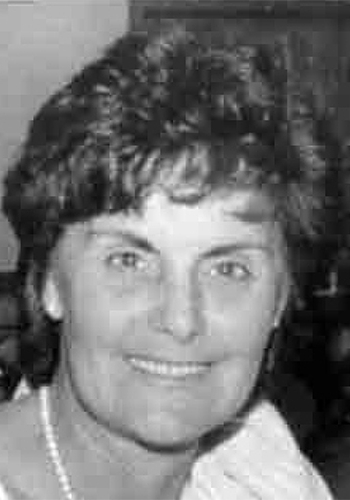National Missing Persons Week
National Missing Persons Week
2014: Dementia and missing persons
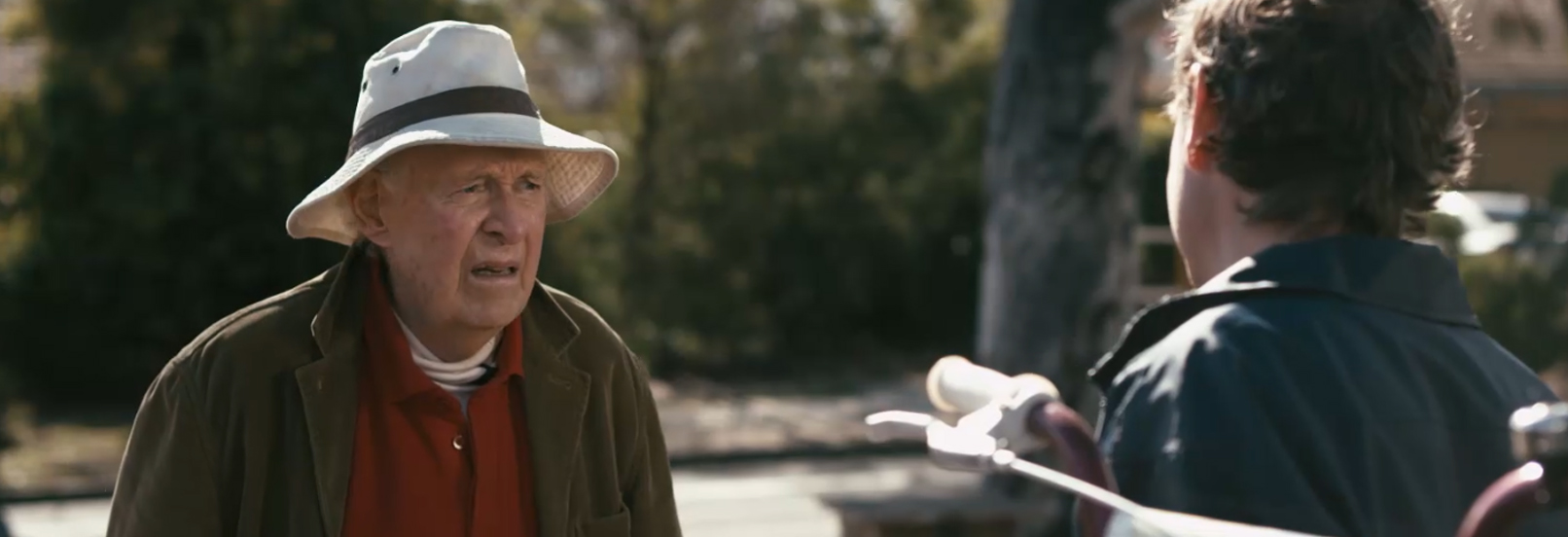
In 2014 the National Missing Persons Coordination Centre's focus was on raising awareness within the community of the links between dementia and missing persons. Each year the we build awareness messaging around one of the key groups in the community most at risk of going missing.
What can I do to help?
If you are a carer of person suffering from dementia who may be at risk of wandering and going missing, consider whether registration in a safe return program, an ID bracelet or other means of identification may be suited to your situation.
The NMPCC also encourages the carers of people with Dementia to consider ways to help those suffering from this illness. This year, the NMPCC has developed a range of merchandise specifically targeted at carers and dementia sufferers, with the theme of "Remembering".
More information
For more information on Dementia and Missing Persons, please view the following NMPCC factsheets:
- Missing persons and dementia fact sheet (PDF 1.2 MB)
- Missing persons and dementia: Safer Walking (PDF 1.2 MB)
- Missing persons and dementia: Wandering (PDF 1.2 MB)
For more information on Alzheimer's and Dementia contact:
Dementia Australia
or call the dementia helpline on: 1800 100 500
2015: Follow your instincts

Research shows there are several myths about missing persons commonly held within the community. One of the NMPCC's awareness objectives is to dispel these myths in the hope that awareness of the facts will reduce the incidence of missing persons. In 2015 the National Missing Persons Coordination Centre will focus on raising awareness within the community of the common myths and facts surrounding missing persons.
The central messaging and branding designed to help communicate the theme is ‘follow your instincts’. Merchandise and advertising has been produced and distributed across Australia to form a national educational strategy in support of this campaign.
Follow your instincts
One of the most common myths surrounding missing persons is that you have to wait before reporting someone as missing. It’s common for people think they need to wait 24 hours, 48 hours, or sometimes even longer before they can make a missing persons report to police.
In Australia, a missing person is defined as anyone whose whereabouts are unknown, and there are immediate concerns for their safety and welfare. If someone you know is missing follow your instincts and report immediately.
More Information
For more information on some of the other common myths surrounding missing persons, please view the following NMPCC publications:
- Missing Persons Myths and Facts Factsheet (PDF 1.1 MB)
- For more information on missing persons contact the NMPCC.
2016: Stay connected

In 2016 the National Missing Persons Coordination Centre will focus on raising awareness of the impacts of missing persons within the community. Our key message 'Missing persons leave frayed edges, Stay connected' reminds us all of the importance of staying connected with family and friends and enhancing the support networks for those most at risk of going missing.
The impact of missing persons
Anyone, regardless of gender, age, ethnicity or educational background, may face the issue of someone they know becoming a missing person. The impact on families and friends, and the missing people themselves, can be both profound and multi-faceted. Commonly reported impacts on family and friends of missing persons include health consequences, time off from work, and financial costs associated with the search.
Impacts on families and friends
Most missing persons are reported to police by family. Research reveals that for every missing person reported, on average at least 12 other people are affected whether it is emotionally, physically, psychologically or financially. For families, not knowing what has happened to someone they love is devastating.
Impacts on missing persons
For the missing person themselves it is often difficult to find the support they require to address their situation. Research conducted in the UK found that “being labelled as missing was traumatic […] and the loss of control to talk about their experiences in a way that was meaningful for them added to the trauma.” Geographies of Missing Persons 2013
People who intentionally go missing often do so to escape or remove themselves from something that isn’t making them happy. These people are generally lacking the support they require to manage their situation and may feel that going missing is their only option. Improving community support is key to reducing the impacts on missing persons.
Impact on the community
Part of our mandate is to reduce the impact of missing persons on the Australian community. Awareness of the issue and enhancing community support mechanisms are key parts of our strategy.
2017: Still waiting for you to come home
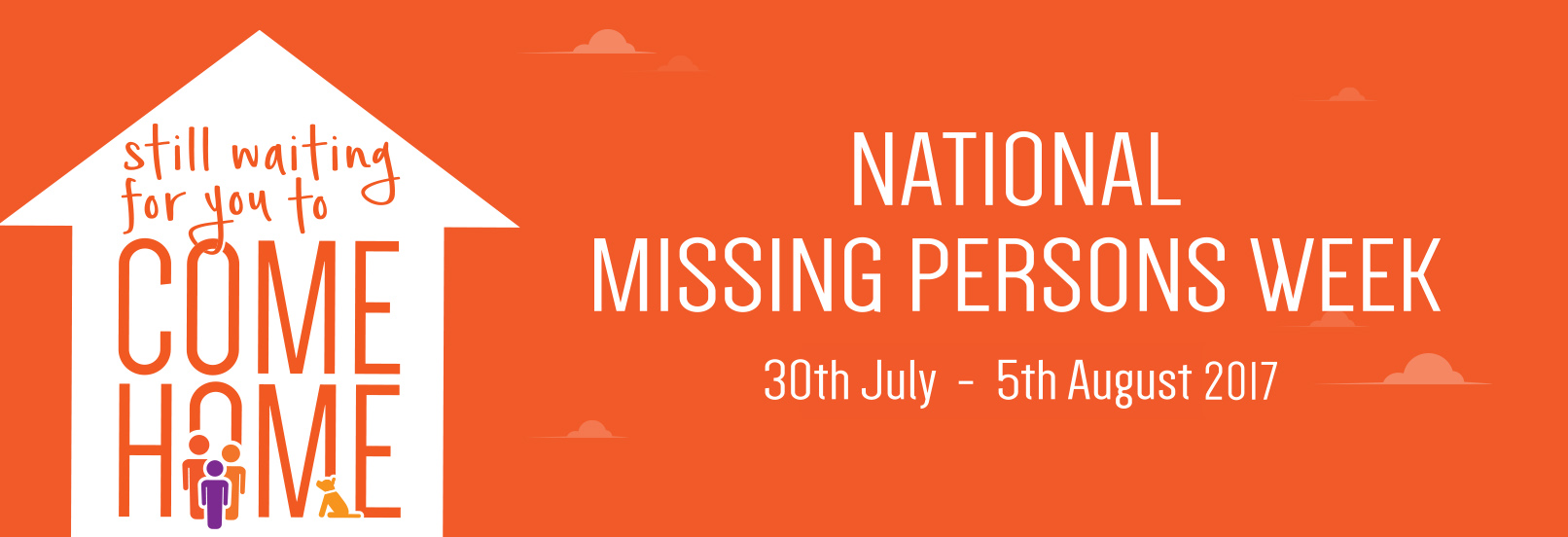
National Missing Persons Week (NMPW) 2017, aims to raise awareness around the high number of ‘youth’ who are reported missing to police each year.
The theme of ‘youth’ was selected as an outcome of the AFP commissioned research ‘Missing Persons in Australia 2008 - 2015’ statistical bulletin (PDF 370KB). The research conducted by the Australian Institute of Criminology (AIC) with data supplied by our state and territory police, found three out of five missing persons reports recorded by police related to a young person under the age of 18. Those in the age bracket of 13 to 17 years accounted for 19,000 of the 38,000 or 50% of all missing persons reports recorded by police each year.
The graphics for this year’s campaign, focus on those families left behind following the disappearance of a loved one, with a message not only to youth, but all missing persons; ‘Still waiting for you to come home’. This message provides hope to all families.
Youth missing
There are many terms that relate to ‘missing’, including disappearance, abduction (both stranger and parental), running away, homelessness, squatting, couch surfing, sleeping rough, staying with friends, going walkabout or just heading off. All these terms can be considered as ‘missing’ if there is a concern for a person’s safety and welfare and their whereabouts are unknown. It may be that young people have been reported missing and don’t realise.
A very small percentage of missing persons cases in Australia are stranger abductions. Young people (those under the age of 18) go missing for a number of reasons including family and social conflict, wanting to become independent, being the victim of crime, forgetting to communicate, mental health problems, drugs/alcohol abuse as well as escaping from other abuse and neglect.
Most young people who are reported missing disappear for short periods of time before either being located or returning home. Going missing is seen by young people as a way of resolving tension or conflict at home or within friendship groups, but if the underlying factors are not addressed when they return and the issues remain, they are at greater risk of going missing again.
Factors that should be considered in determining if a young person is at risk of going missing include deteriorating academic performance, truancy, personality/mood changes, acting out and risk taking behaviors, inappropriate peer groups and substance abuse.
Whilst it is not a crime to go missing there are vulnerabilities present when someone disappears. Lack of access to support, financial constraints, poor hygiene, substance abuse etc. may all impact on a young person’s ability to keep safe.
2018: 30th National Missing Persons Week
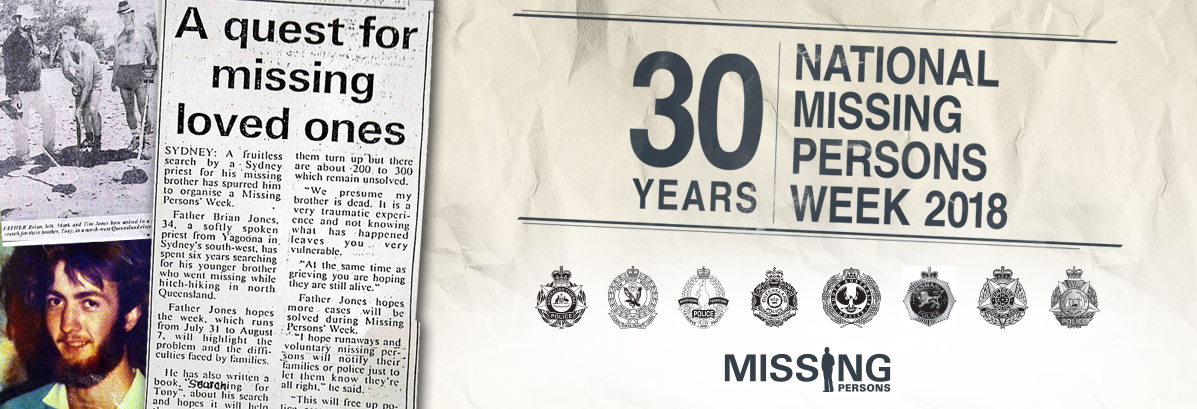
The Australian Federal Police (AFP) is providing Australians insight into the emotional pain faced by loved ones of missing persons, with a short film launched today marking the 30th anniversary of National Missing Persons Week (NMPW). The week will run from 5-11 August 2018.
AFP Deputy Commissioner Neil Gaughan said he hoped the short film – which can be viewed on Facebook from 7am – will give the community a window into the profound heartache caused by this issue, as well as the critical role they can play in supporting police.
“This film echoes the real life grief of so many Australians who live in constant uncertainty, not knowing if or when their loved one will come back,” DC Gaughan said.
The concept of the short film was inspired by the real impacts and challenges faced when someone goes missing. In particular, many families across Australia are living with ambiguous loss, holding onto physical ties and the hope that their missing loved one will return.
Eileen Fahey, whose son Anthony Fahey went missing in 2013, said the film’s narrative is similar to her own experience.
“While we are currently endeavouring to sell our house, it’s upsetting because what if Anthony comes home and someone else is living here? How will he find us, how will he feel, what will he do?” Ms Fahey said.
“I also worry that, if we sell, I won’t have the memories of him being in the house. I’m afraid that I’ll forget the image of him sitting at the end of the bench and the sound of his voice. It’s all tied up in the house – how can I leave it?”
DC Gaughan said that, as part of the 30th NMPW activities, the AFP and its state and territory counterparts are also profiling 30 long-term missing people from around the nation on social media and outdoor advertising.
“It’s important that we raise awareness of this issue, including the reasons why people go missing, the social and financial impacts, and how the community can get involved. This might mean taking an interest and sharing our social media posts, or sharing a photo of an outdoor advertisement. After all, the community is our eyes and ears in these cases, helping police find the many thousands of people who go missing each year.”
“If you recognise any of the missing people profiled this NMPW, or indeed any of the 2600 long-term missing persons on the Public Register at www.missingpersons.gov.au, please contact Crime Stoppers on 1800 333 000,” DC Gaughan said. “You might just have a piece of information that could help bring them home.”
The AFP’s NMPW 2018 activities are coordinated through the agency’s National Missing Persons Coordination Centre (NMPCC), with the short film created by Sydney-based creative firm Common Ventures.
NMPW is supported by the Outdoor Media Association.
For more information on the NMPCC and NMPW 2018, visit: www.missingpersons.gov.au and www.facebook.com/AFPNMPCC. The short film can be downloaded here.
Media enquiries and interview requests:
For more information or to request an interview, contact AFP National Media on 0437 477 430.
Subscribe and receive email alerts
(link: https://www.afp.gov.au/news-media/media-releases) when new media releases are published.
2019: Individuals not statistics
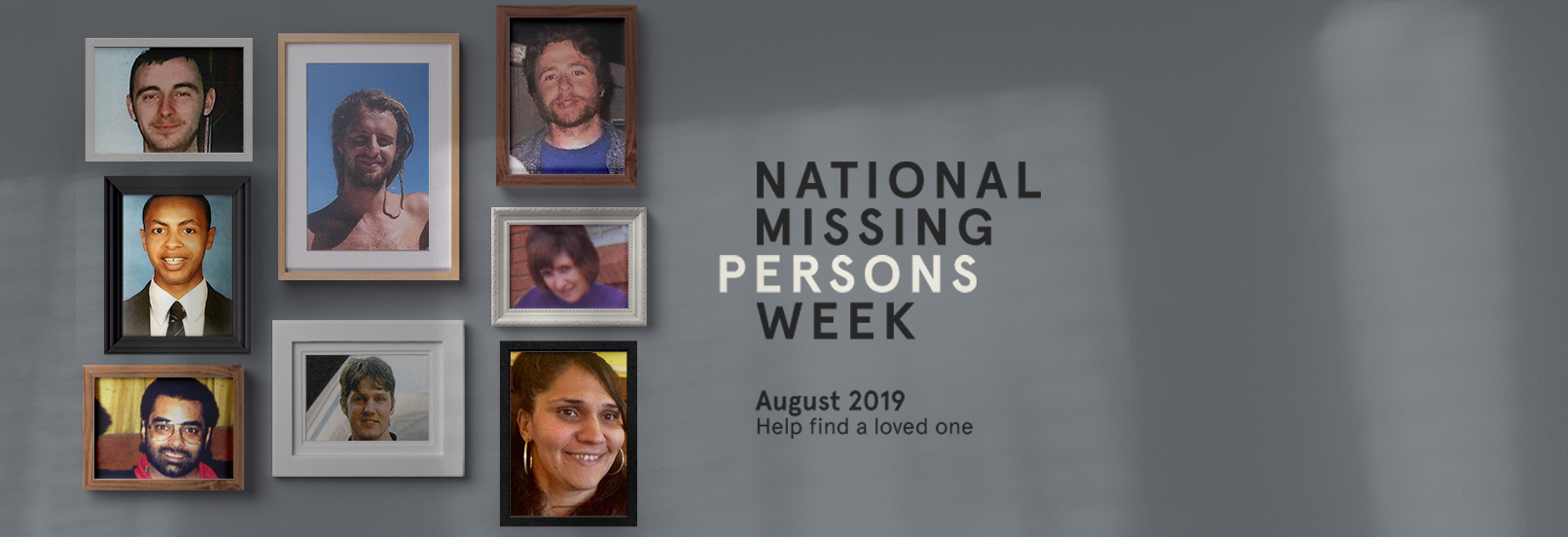
Annually during National Missing Persons Week (NMPW) the National Missing Persons Coordination Centre (NMPCC) strives to create awareness throughout the wider Australian community, specifically those who have never thought about a missing person or the impact it has.
In 2019, National Missing Persons Week falls on 4-10 August, and is centred on the theme of ‘Individuals Not Statistics’.
It is sometimes easy to generalise the 2,600 long term missing persons in Australia and lose the essence of the individual. The people captured in the statistic are not just ‘missing persons’, they are fathers and daughters; students, chefs and academics.
To continue this narrative, the 2019 NMPW campaign will go beyond the statistics and focus on eight long-term missing persons from around the nation. Unlike previous years, the new design removes the ‘persons’ from National Missing Persons Week and replaces it with the name of the real person being profiled.
To complement the profiling element of the campaign, the National Missing Persons Coordination Centre have also joined forces with media personalities and social media influencers to amplify messaging on social media during National Missing Persons Week. The influencers will use their platform to share content to raise awareness of the issue and the importance of the week.
The eight profiles have been selected by the NMPCC in consultation with State and Territory Missing Persons Units and can be viewed here.
2020: “I’ll see you later”
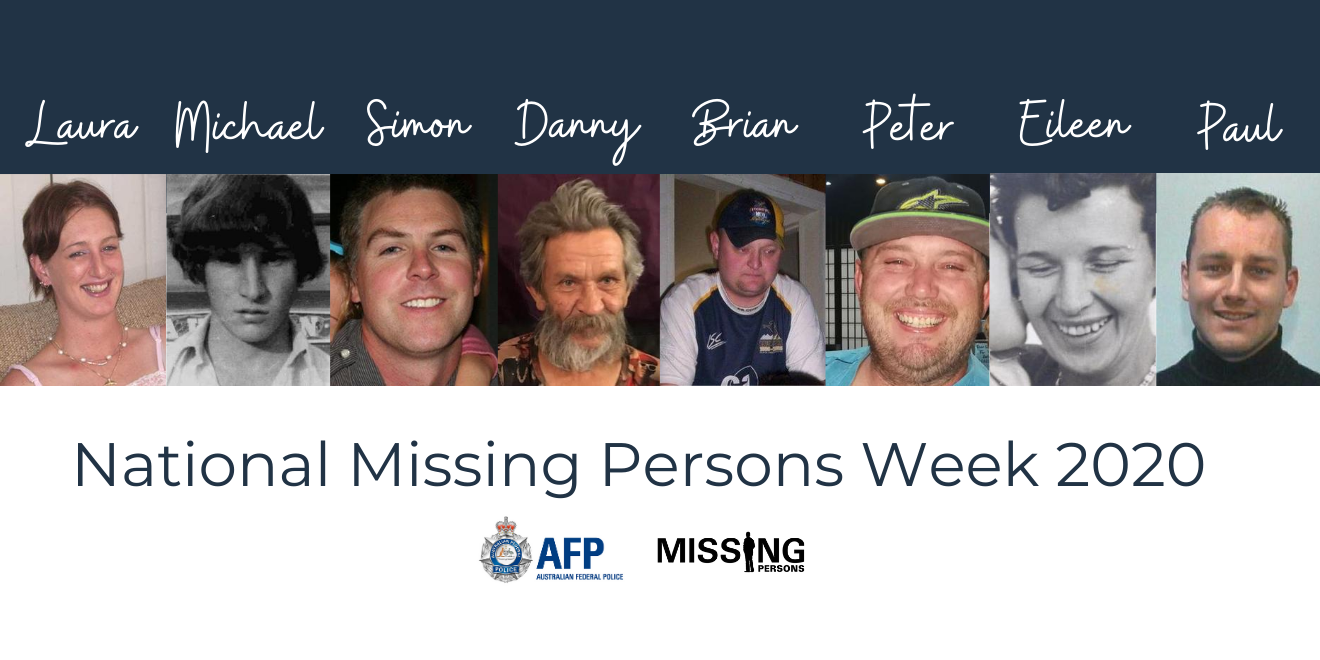
National Missing Persons Week (NMPW) is an annual event held during the first week of August which aims to raise awareness of the significant issues associated with missing persons, as well as helping to reduce the incidence and impact of missing persons in Australia.
NMPW originated in 1988 in Townsville following the disappearance of Queensland resident, Tony Jones, in 1982. The inaugural week took place with a memorial service, where the Mayor of Townsville planted a tree in commemoration of Mr Jones.
NMPW 2020 was recognised from 2-8 August with the policing campaign centered on the theme, “I’ll see you later.”
This phrase sheds light on the fact, when a person goes missing, their loved ones are always searching. Even as time passes and logic whispers that the missing person is unlikely to be found, some part of the loved one can’t stop looking.
In the mind of a missing persons loved ones, the simple phrase transforms with almost every aspect of life experienced.
In reality to the families and friends of a missing person “I’ll see you later” can mean:
- “I’ll see you every time the doorbell rings”
- “I’ll see you in crowds on TV”
- “I’ll see you every time police find a body”
With this campaign the NMPCC aimed to highlight these thoughts that run rampant in the minds of loved ones when they are left wondering, and hoping their missing husband, mother, uncle or sister will return home.
The NMPCC will highlighted this theme via a digital campaign comprising of eight short videos. Each short video highlighted a different long-term missing person whom has been selected in consultation with State and Territory Missing Persons Units.
In 2019 the NMPCC focused on the theme ‘individuals not statistics’, which saw the word ‘persons’ in National Missing Persons Week replaced with the name of the missing loved one being featured in the campaign. E.g. National Missing Brian Week.
This emphasized the fact missing persons are real people, with hobbies and dreams, who continue to live in the memories of those left behind. That they are more than just statistics or photos on a missing persons poster.
To continue on with this narrative in 2020 and to keep real missing Australians at the forefront of the messaging during the 2020 NMPW, the NMPCC decided to incorporate the theme for a consecutive year.
NMPW 2020 was supported by the Outdoor Media Association who, through their members, once again generously donated advertisement space across various locations from across Australia.
The profiles selected by the NMPCC in consultation with State and Territory Missing Persons Units for the 2020 NMPW campaign and can be viewed here.
2021: "Their faces may have changed. Missing them hasn't"
This year National Missing Persons Week (NMPW) will be recognised from 1-7 August 2021. The theme of this year’s national police campaign is, ‘Their faces may have changed, missing them hasn’t’.
For further information on this year's NMPW, please click here.
2022: "Without Them"

This year National Missing Persons Week (NMPW) will be recognised from 31 July - 6 August 2022. The theme of this year’s national police campaign is, “Without Them”.
For further information on this year's NMPW, please click here.
2023: "Can You Solve The Case"
This year National Missing Persons Week (NMPW) will be recognised from 30 July - 5 August 2023. The theme of this year’s national police campaign is, “Can You Solve The Case”.
For further information on this year's NMPW, please click here.
2024: "Always Searching"
This year National Missing Persons Week (NMPW) will be recognised from 28 July - 3 August 2024. The theme of this year’s national police campaign is, “Always Searching”.
For further information on this year's NMPW, please click here


